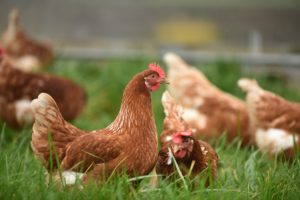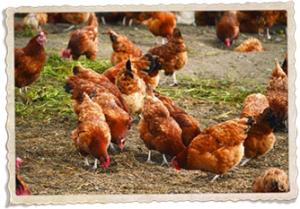Earlier in the year, we discussed how best to take care of your chickens during the cold, winter months. But now that the temperatures are rising, we must turn our attention to the coming summer months. Summer, just like winter, brings its own host of challenges when caring for your backyard flock. As such, preparing in the weeks and months prior can help you better care for your chickens during the dog days of summer.
Beating the Heat
Obviously, the biggest threat your chickens will face during the summertime is the heat. This is especially true if you live anywhere in the Southern United States. Of course, even if you live up north, there is always the chance of a heatwave rolling in. You need to have tools and resources ready to help your chickens beat the heat.
How hot is too hot?
Some chickens can tolerate heat better than others. Nevertheless, the general rule of thumb of is that any temperature over 90 degrees Fahrenheit is too hot for your chickens. If they’re exposed to these kinds of temperatures for an extended period, then their risk of heat stress and heat-related illnesses grows.
Know the signs of heat stroke
If a particularly hot day comes, it’s important that you keep an eye on your chickens. Knowing the signs and symptoms of heat stroke can help you identify it earlier and get your chicken treated as soon as possible. The sooner they are treated, the more likely they are to survive.
Below are some of the most common symptoms of heat stroke in chickens:
- Panting or breathing heavily through an open beak while moving their tongues up and down
- Lethargy
- Lack of appetite
- Standing with their wings held out away from their body
- Decreased egg production
- Pale or discolored combs and wattles
Check their temperature
Checking your chickens’ temperatures can help you determine if they are cool and comfortable. A normal chicken’s body temperature will range between 105-107 degrees Fahrenheit. Anything higher than that could be a sign of heat stress or illness.
Set up shady areas
As you likely know, shaded areas are much cooler than non-shaded areas. To keep your chickens cool, make sure you have plenty of shady areas both outside and inside where they can take a break from the sun. If you don’t have many shady areas, then consider planting trees or bushes that your chickens can rest under.
Provide proper ventilation
Your chickens won’t be spending all their time outside. When they’re inside, they’ll want to be kept cool and comfortable. While chicken coops won’t have air conditioning, they should have plenty of ventilation to allow the air to cool down and to invite in a nice cross-breeze from outside.
Keep Your Chickens Hydrated
When temperatures rise, the risk of dehydration rises, too. Your chickens need access to plenty of fresh, cold water (typically 500 milliliters per day) to prevent dehydration and heat stroke.
Provide extra waterers
Your chickens will likely be drinking more water the hotter it gets. As a result, you may find that the number of waterers you currently have won’t cut it. Add in one or two extra waterers to ensure that your chickens never run out of water.
Keep the waterers in the shade
In addition to adding more waterers, you should also change where the waterers are located. If possible, place your waterers in shaded areas of your coop to ensure the water stays cooler for longer.
Ensure the water is cold
On a hot, summer day, which would you rather have—a glass of cold water or a glass of warm water? Chances are you’d prefer the former, and your chickens would too. To keep their water cold, you can freeze it in a storage container before adding it to the waterer. If that’s too much hassle, you can simply add ice cubes to your chicken’s water throughout the day.
Keep Your Chickens Fed
Many people understand the importance of staying hydrated in the summer. But it’s just as important to stay fed. A well-fed chicken is healthier and able to withstand higher temperature. However, what you feed your chickens may change during the summer months.
Add fruits and veggies
Supplementing your chicken’s diet with fruits and veggies can help lower their body temperature during particularly hot days. They’re also a good alternative to corn and scratch which can actually raise their body temperatures as they require a lengthier digestion process. Chickens love watermelons, strawberries, pineapples, and bananas. Just make sure you chop them up so they’re easy to eat.
Freeze their treats
If you plan on giving your chickens fruits and veggies, consider freezing them! Frozen fruits and veggies are sweet and delectable, especially on a hot summer’s day.
Consider adding oyster shells
If your chickens are producing fewer eggs, it’s likely due to the heat. You can help support their egg production by adding in oyster shells to their feed.
Have more questions on how to care for your chickens this summer? Then contact Chickens for Backyards today!

